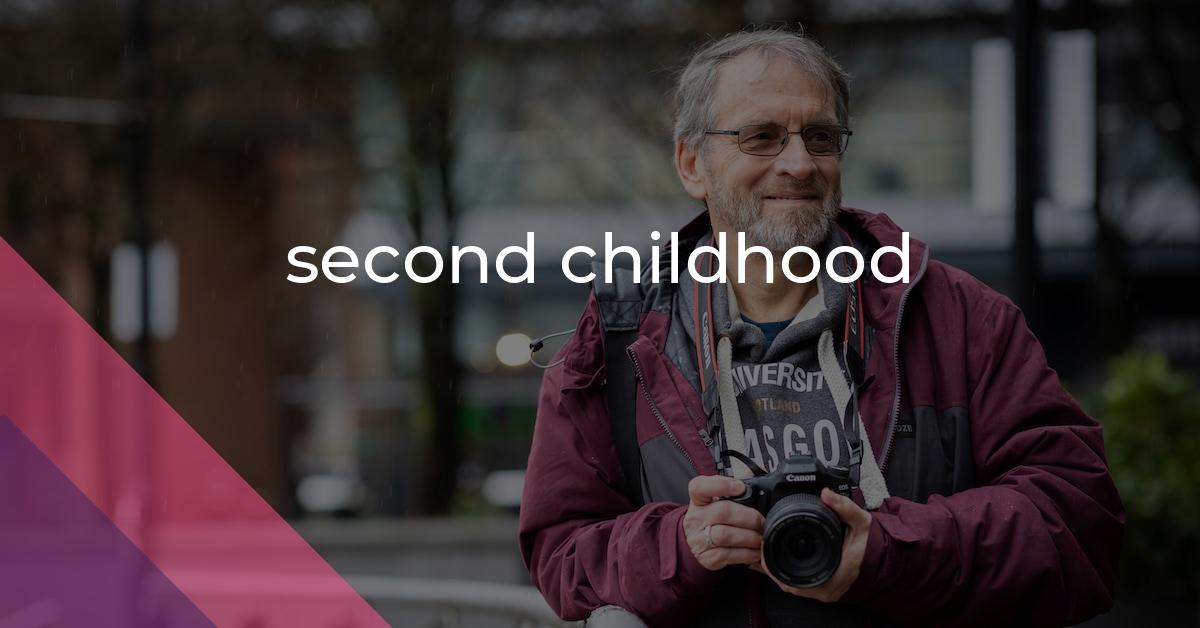second childhood: Idiom Meaning and Origin
What does ‘second childhood’ mean?
The idiom "second childhood" refers to a period in a person's life when they exhibit childlike behavior and interests, often due to old age or illness.

Idiom Explorer
The idiom "second string" refers to a person who is not as important or skilled as someone else in a particular situation or role.
The idiom "second-rate" refers to something of inferior quality or standard compared to others in the same category.
The idiom 'second nature' means something that is so familiar or habitual to a person that it feels natural and effortless. It refers to a behavior or skill that has been practiced and repeated so often that it becomes automatic, like a reflex.
The idiom "second gear" refers to the next level of effort, speed, or intensity in a particular activity or situation. It implies a higher level of performance or action being taken compared to the initial phase or starting point.
The idiom "second fiddle" means to play a subordinate or less important role compared to someone else, often feeling overshadowed or unnoticed.
The idiom "salad year" refers to a youthful or inexperienced period of someone's life, often characterized by naivety, idealism, and lack of practical experience or wisdom.
The idiom "ripe old age" means reaching an advanced and mature stage in life, often referring to someone who has lived a long and fulfilling life.
The idiom "problem child" refers to a person or thing that consistently causes difficulties or trouble.
The idiom "prime of life" refers to the period of time when a person is in their most productive or successful stage of life, typically in their middle age. This is the time when individuals are at their peak in terms of physical, mental, and emotional abilities.
The idiom "play second fiddle" means to take on a subordinate or less important role.
Hidden Meaning
The concept of "second childhood" is often associated with the idiom "come of age." While "come of age" typically refers to the transition from adolescence to adulthood, it can also describe a later stage in life where individuals experience a rediscovery of their childlike qualities. This is similar to the idea of a second childhood, where adults embrace a carefree and playful mindset, free from the responsibilities of adulthood.
Another related idiom is the "Peter Pan syndrome," which refers to individuals who resist growing up and remain emotionally or psychologically stuck in a state of perpetual youth. These individuals may exhibit traits typically associated with children, such as a fear of commitment or an unwillingness to take on adult responsibilities. The Peter Pan syndrome is closely tied to the concept of second childhood, as both describe adults who refuse to fully embrace the expectations and demands of adulthood.
The idiom "grow up" is often used to encourage someone to mature and assume adult responsibilities. In contrast, the idiom "grow out of" suggests the natural progression of individuals out of certain behaviors or stages. When someone experiences a second childhood, they may temporarily "grow out of" their adult mindset and revert to a more childlike state of being. This can manifest in various ways, including a renewed sense of wonder, spontaneity, or playfulness.
Lastly, the phrase "over the hill" is another idiom commonly associated with the concept of second childhood. "Over the hill" is often used humorously to describe people who have reached a certain age where they may romantically reminisce about their youthful days while also embracing a carefree and fun-loving outlook. This aligns with the notion of second childhood, as it highlights a period of life where individuals embrace their inner child while reflecting on their past experiences.
Overall, the idiom "second childhood" captures the essence of adults displaying childlike behavior or characteristics, and it is closely intertwined with idioms such as "come of age," "Peter Pan syndrome," "grow up," "grow out of," and "over the hill." These idioms provide further insight into the various dimensions of second childhood, shedding light on the motivations, attitudes, and societal expectations surrounding this complex phenomenon.
Example usage
Examples of how the idiom *second childhood* can be used in a sentence:
- My grandfather loves to play with toys and act silly; I think he's entered his second childhood.
- After retiring, Mary decided to travel the world and try new activities, embracing her second childhood.
- When the power went out, the adults started playing hide and seek, engaging in a playful second childhood.
The idiom *second childhood* is used to describe a period in someone's life, usually in their later years, when they exhibit childlike behavior or interests. It implies a return to the carefree and playful nature of childhood, often associated with activities or behaviors that are considered childish or immature.
More "Age" idioms



